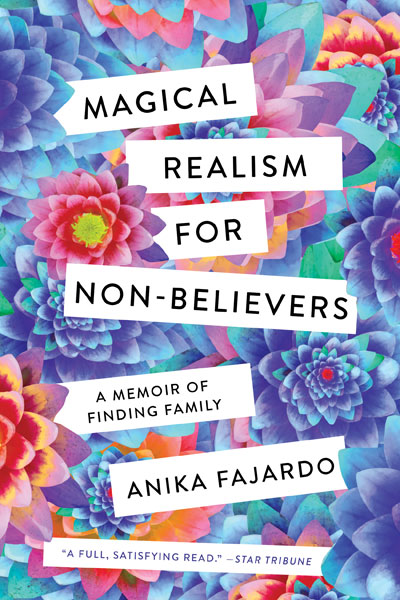
Reviewed by Sarah James
In 1995, Colombia- the background for Annika Fajardo’s delightful memoir, was a less than ideal place. Lawless, corrupt and with high drug and gang activity, it seems most unfitting for a young Minnesota raised woman just blossoming into adulthood. But for Anika Fajardo- this place was home, the place she was born and the life she was forced to abandon. Her father, someone she accepted as loving Columbia too much to leave was no more than a stranger. His house unfamiliar and only an echo of a memory on Fajardo’s first night sleeping over in the opening chapter, her baby items lay strewn in the hall, a ghostly reminder to her adult self of a life left behind, a journey that she is now about to discover. Spanning key events from her early adulthood up to now, we have the pleasure of accompanying Fajardo along her life’s journey, navigating the memories of childhood, the memories of others and the should haves and possibilities.
Fajardo is such a deep thinker, and her empathy allows for an enriching read, each family member portrayed so fully so that nobody feels side-lined. Despite this depth, this is a fairly digestible read, even for the casual bookworm. Definitely one that is unique, one I would highly recommend to those interested in dipping their toes into Hispanic or Latin culture. Personally, as someone who knows very little it was a beautiful gateway into learning about Columbia and has inspired me to look into a future trip to South America.
The highlight of this book of course are the many images to mull over, “the world getting colored in like a child’s drawing, one object at a time,” as Fajardo puts it. The language is rich, painting a delicate setting of place and characters that we get to know at the same time as our author, an almost coming of age story of the difficulties of split cultures. We discover family members at the same time as Fajardo and age with them following her through key moments of her life. An interesting aspect of ‘Magical Realism For Non-Believers’ remains the discussions of cultural blending between families, the intrinsic nature of growing up as a split culture kid, the feeling of being “other”, too ‘Colombian’ for Minnesota and too ‘Midwest’ for Colombia. Fajardo’s parents own pairing of Columbian and American mirrors herself and her partners David’s. This reflects beautifully in the book, Fajardo does a good job of drawing comparisons between the two settings; the frigid cabins of childhood In northern Minnesota, contrast the bohemian, hedonistic warmth of 90’s Columbia. At times, there is almost sexual freeing liberation to Columbia, that Fajardo explores one that feels it has long slept and been suppressed by Midwest restraints, where Scandinavian and Christian tradition govern fundamentalist beliefs.
A natural storyteller, Fajardo writes in a way that is emotional and compelling, her memory so sharp that images spring from the page, personifying Colombia’s vast landscape, the “huge leaves” and “piles of mangoes” alike. World building moulds easily here. Absolutely loaded with personal anecdotes, Fajardo has a natural talent of connecting with us, she writes so freely and opening as if speaking with a long-lost friend. We spend much time imagining, wondering and romanticising with Fajardo on what is essentially, her migration home. The book feels almost familiar and comforting, even in times when the topics are painful, I remained grateful as Fajardo’s unwavering positivity and optimism and breezed through this read on a warm spring evening.
Although at times, focus seems to waver and we jump around and between stories often; it can be hard to follow, chapters sometimes flickering between the years. It’s not too distracting and doesn’t take away from the story overall. I also wasn’t particularly convinced on the connection to magical realism although again it wasn’t a distraction. The stories, no doubt are told with a great amount of
love for culture and family, as we follow Fajardo navigating the complex emotions of young adult life, the ins and out of finding one’s self, accepting and finding family, lost and found again, the loss and finding of the self, the book finally cumulating with the greatest gift of all, the birth of her own child and also the birth of her half-brother’s child, as the two become raised as cousins. To say much more almost feels as though it would be doing the book an injustice, after all, this is Fajardo’s story to tell, and it couldn’t be put in better words than her own. ‘Magical Realism for Non-Believers’ is a truly wonderful, warming and uplifting read.